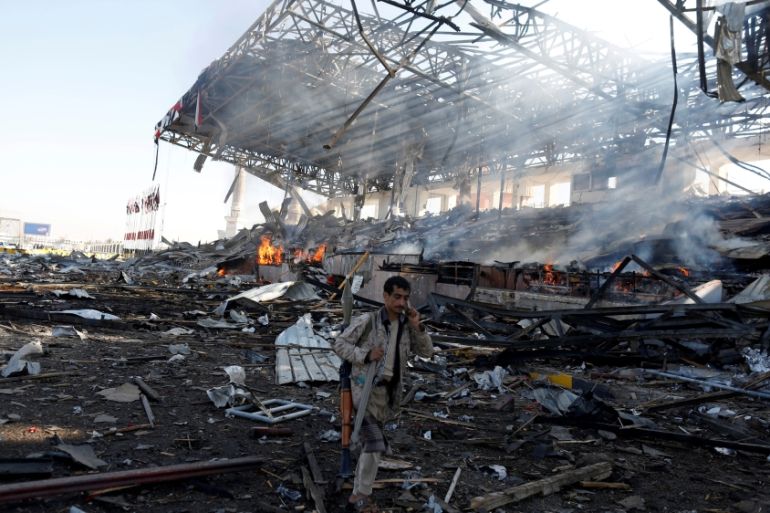Have Saudi and the UAE’s aims in Yemen war shifted?
Reports of Saudi keeping Yemen’s president under house arrest raise questions over the coalition’s aims in the war.

Questions over the Saudi-led coalition’s aims in Yemen are mounting in the wake of reports that the kingdom has placed the Yemeni president under house arrest.
On Tuesday, the Associated Press news agency reported that Riyadh had barred the Yemeni President Abd-Rabbu Mansour Hadi, his sons, ministers and military officials from returning home for months.
Yemeni officials told AP that the ban was due to enmity between Hadi and the United Arab Emirates and that Saudi officials rejected Hadi’s requests to travel to Yemen, claiming it was unsafe for him to return.
The UAE and Saudi Arabia entered Yemen’s war in 2015 as part of a military coalition.
The two Gulf countries wanted to restore Hadi’s government to legitimacy after a civil war broke out between Hadi’s supporters and those loyal to the former President Ali Abdullah Saleh, who was overthrown during popular protests in 2011.
But according to some Yemenis, the coalition’s goal has shifted.
Khaled al-Ansi, a Yemeni political analyst, says that Saudi’s move to keep Hadi from returning to Yemen means that it has “failed in defeating the [Houthi] coup” and is now “turning its back on legitimacy”.
“Saudi claims that it has liberated Aden and has control over it and that the coalition ended the coup there. But at the same time, it says that it cannot protect Hadi in Aden. Then what does this mean?”
The southern city of Aden is the temporary base of Yemen’s government and has seen a wave of bombings and shootings targeting officials and security forces in recent months.
“As Yemenis, the picture has become clear for us. We accepted the presence of the coalition for defending legitimacy – not to ruin it. Now we find that there is an agenda different to the stated one – Saudi’s presence in Yemen has become illegal,” al-Ansi told Al Jazeera from Istanbul.
“This is one of the points that the Houthis use – they say that we are here on the ground and Hadi is not able to be present in any of the areas that Saudi and the coalition claim they have liberated.”
Different agendas?
Saudi Arabia has expressed that it “wants out” of Yemen while the UAE has become more involved in the conflict, indicating a divide in the two countries’ agendas.
In August, a series of leaked emails found that Mohammed bin Salman, Saudi Arabia’s crown prince and defence minister, expressed a desire to end the war in Yemen during talks with former US officials.
The UAE, meanwhile, has been financing and training armed groups in the south of the country. Those groups answer to Aidarous al-Zubaidi, the UAE’s “man in the south” and leader of the southern secessionist movement.
In May, the London-based Middle East Eye news website, quoting sources, revealed that Hadi had accused Sheikh Mohammed bin Zayed, the crown prince of Abu Dhabi, of acting as an occupying force, as opposed to a liberation force.
Soon after, Anwar Gargash, the UAE’s minister of state for foreign affairs, said in a tweet believed to be aimed at Hadi: “Among the rules of political action is that you should build trust with your allies, that you should not stab them in the back, that your decisions should be commensurate with your capabilities and that you put public interest ahead of personal ones.”
Meanwhile, Dhahi Khalfan, Dubai’s outspoken police chief, has demanded Hadi’s dismissal.
![Abd-Rabbu Mansour Hadi was elected president after protests lasting nearly a year against former President Ali Abdullah Saleh [AFP]](/wp-content/uploads/2017/11/e4c00a9a30fe424ba2192fea5e1cf345_18.jpeg)
An AP investigation in June found that the UAE is running more than a dozen secret prisons in the south, but Yemen has denied that and claims that all the security forces are under Hadi’s control.
Reports by rights groups have also found that the UAE is funding and directing a “Security Belt” – a force created in 2016 that has been responsible for arbitrarily detaining and abducting people.
As the UAE expands its role, military forces that were once loyal to Hadi’s government have become absent.
Reality on the ground dividing Hadi supporters
In August, a confidential report conducted by a UN Security Council panel of experts determined that although one of the Saudi-led offensive’s main objectives was to reinstate Hadi, the political reality on the ground succeeded in dividing Hadi’s supporters – some of whom are now fighting for legitimacy.
The south has formed a “competing political council … with a stated goal of an independent South Yemen”, the UN report said. “It [the council] includes key officials and members of the legitimate government.”
The report examined how proxy militia groups, populated with members of the Saudi-led coalition, are pursuing individual agendas – the result of which has further weakened Hadi’s position.
Despite being mired in the war for more than two years, the coalition has so far failed to achieve its stated aims as Houthi rebels continue to hold the capital Sanaa and control the country’s north.
The war has taken a huge toll on the country – more than 10,000 civilians have been killed, and millions of Yemenis have been left without basic necessities.